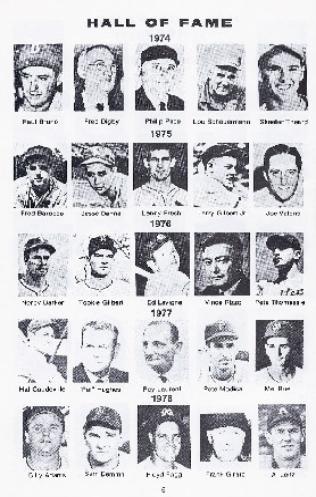
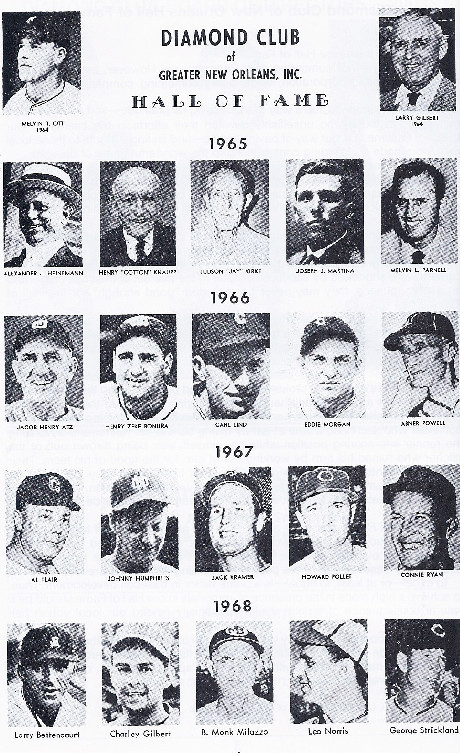
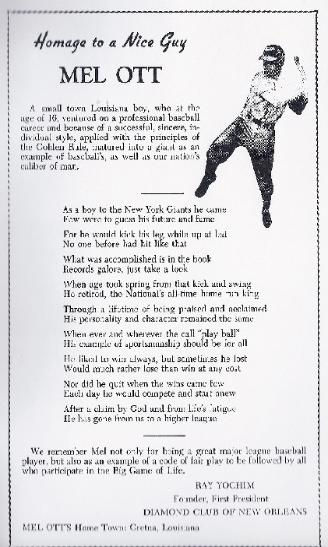
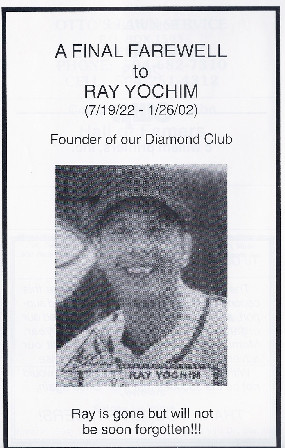
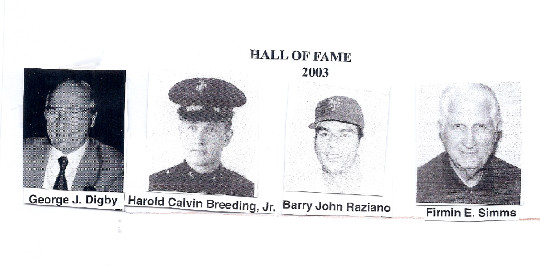
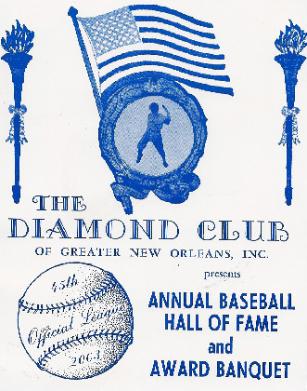
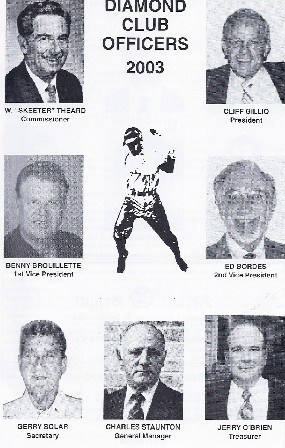
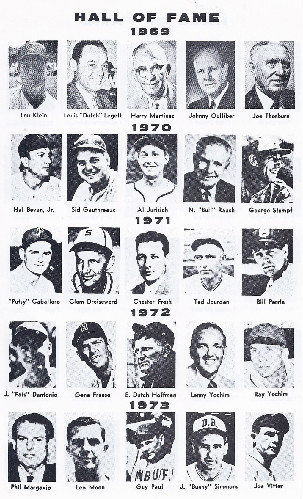
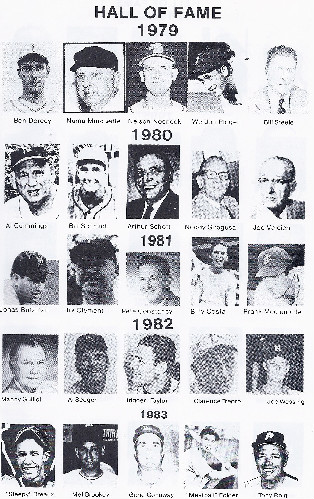
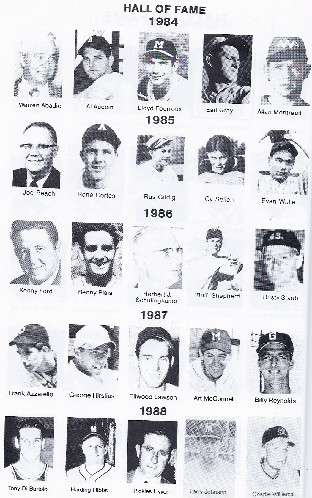
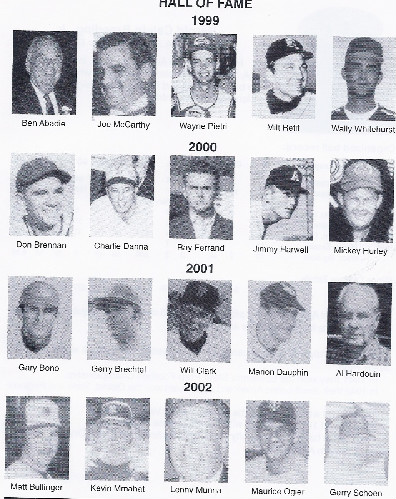
DIAMOND CLUB OF NEW ORLEANS HALL OF FAME
Just what is this Local Hall of Fame?
Certainly, we're not competing with Cooperstown. However, as a local, independent, non-profit
corporation, we're doing something comparable at a local level.
This is the Diamond Club's way of expressing its gratitude - and establishing a memorial - to
those who unselfishly devoted their efforts in the interest of our National Pastime. It is our way
of paying public - and lasting - tribute to those local men who made outstanding contributions to
the wonderful game of baseball.
Is it proper for us to say who is great and who is not so great? We don't think so. Being
elected into the Hall of Fame cannot add to the stature of the honorees. An outstanding
baseball player is made up of many components, probably the most essential of which is skill.
And while the gift of skill is a precious thing, it is also an elusive thing.
It is a foregoing conclusion that everyone from this area who participated in our great game of
baseball won't merit Hall of Fame recognition. There are many who never attained greatness -
although they possessed rare potential - because their careers were shortened by sacrifices -
made in the interest of their ball club - and as in consequence, they may never be regarded
"good enough" for the Hall of Fame.
Baseball fans and commentators rely on the value of statistics - and this is probably true
because baseball is a game of percentages. But these elements should never be regarded as a
gauge to the detriment of those not so honored - because statistics fail to recognize and give
credit to the team players.
For example - in studying statistics, you won't find recognition given to the catcher who had his
fingers broken stopping a bad pitch, or a bad throw to prevent the runner from advancing
another base into scoring position, or the infielder who refused to be taken out of a play and
was cut down by the oncoming runner, or the outfielder who sacrificed a time at bat by hitting
behind the runner and advancing the runner into scoring position while he, himself, was being
thrown out; or the pitcher who ruined his arm by working out of turn for the good of his team.
Their accomplishments won't be found in the record books - but they will never be forgotten by
teammates who benefited from their unselfish devotion. These men - who made baseball the
game it is - must be given a place beside the so-called super-star.
Each Hall of Famer was once a boy - just like any youngster of today - and as youths, they, too,
were here-worshippers. It is our sincere and fervent hope, therefore, that our Hall of Fame will
ever be an incentive to the local player - because the baseball star of the past is the guiding
light of the present.
To excel - or at least, to equal - is a prime factor in baseball development. Thus, to achieve a
high place in the presence of immortals in our Hall of Fame should be a natural consequence of
human desire - especially among our local young ball players.
Does this recognition have any value to the Hall of Famers - like that of money or plaudits of
wide renown? No. Rather it represents a sacred reward that only the boy, and later man,
saturated with an abundant spirit of baseball, can fully understand and appreciate.
By John M. Jourdan, late past president of the Diamond Club
Just what is this Local Hall of Fame?
Certainly, we're not competing with Cooperstown. However, as a local, independent, non-profit
corporation, we're doing something comparable at a local level.
This is the Diamond Club's way of expressing its gratitude - and establishing a memorial - to
those who unselfishly devoted their efforts in the interest of our National Pastime. It is our way
of paying public - and lasting - tribute to those local men who made outstanding contributions to
the wonderful game of baseball.
Is it proper for us to say who is great and who is not so great? We don't think so. Being
elected into the Hall of Fame cannot add to the stature of the honorees. An outstanding
baseball player is made up of many components, probably the most essential of which is skill.
And while the gift of skill is a precious thing, it is also an elusive thing.
It is a foregoing conclusion that everyone from this area who participated in our great game of
baseball won't merit Hall of Fame recognition. There are many who never attained greatness -
although they possessed rare potential - because their careers were shortened by sacrifices -
made in the interest of their ball club - and as in consequence, they may never be regarded
"good enough" for the Hall of Fame.
Baseball fans and commentators rely on the value of statistics - and this is probably true
because baseball is a game of percentages. But these elements should never be regarded as a
gauge to the detriment of those not so honored - because statistics fail to recognize and give
credit to the team players.
For example - in studying statistics, you won't find recognition given to the catcher who had his
fingers broken stopping a bad pitch, or a bad throw to prevent the runner from advancing
another base into scoring position, or the infielder who refused to be taken out of a play and
was cut down by the oncoming runner, or the outfielder who sacrificed a time at bat by hitting
behind the runner and advancing the runner into scoring position while he, himself, was being
thrown out; or the pitcher who ruined his arm by working out of turn for the good of his team.
Their accomplishments won't be found in the record books - but they will never be forgotten by
teammates who benefited from their unselfish devotion. These men - who made baseball the
game it is - must be given a place beside the so-called super-star.
Each Hall of Famer was once a boy - just like any youngster of today - and as youths, they, too,
were here-worshippers. It is our sincere and fervent hope, therefore, that our Hall of Fame will
ever be an incentive to the local player - because the baseball star of the past is the guiding
light of the present.
To excel - or at least, to equal - is a prime factor in baseball development. Thus, to achieve a
high place in the presence of immortals in our Hall of Fame should be a natural consequence of
human desire - especially among our local young ball players.
Does this recognition have any value to the Hall of Famers - like that of money or plaudits of
wide renown? No. Rather it represents a sacred reward that only the boy, and later man,
saturated with an abundant spirit of baseball, can fully understand and appreciate.
By John M. Jourdan, late past president of the Diamond Club
| The Diamond Club of Greater New Orleans Submitted by Fred Bullinger |
| A small town Louisiana boy, who at the age of 16, ventured on a professional baseball career and because of a successful, sincere, individual style, applied with the principles of the Golden Rule, nurtured into a giant as an example of baseball's, as well as our nation's, caliber of man. As a boy to the New York Giants he came Few were to guess his future and fame For he would kick his leg while up at bat No one before had hit like that. What was accomplished is in the book Records galore, just take a look. When age took spring from that kick and swing He retired, the National's all-time home run king. Through a lifetime of being praised and acclaimed His personality and character remained the same. Whenever and wherever the call "play ball," His example of sportsmanship should be for all. He liked to win always, but sometimes he lost, Would much rather lose than win at any cost. Nor did he quit when the wins came few, Each day he would compete and start anew. After a claim by God and from Life's fatigue, He has gone from us to a higher league. We remember Mel Ott not only for being a great major league baseball player, but also as an example of a code of fair play to be followed by all who participate in the Big Game of Life. -- Ray Yochim, Founder, First President, Diamond Club of New Orleans |
| Diamond Club Officers, 2003 |
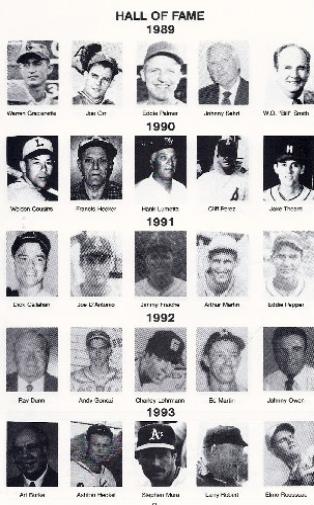
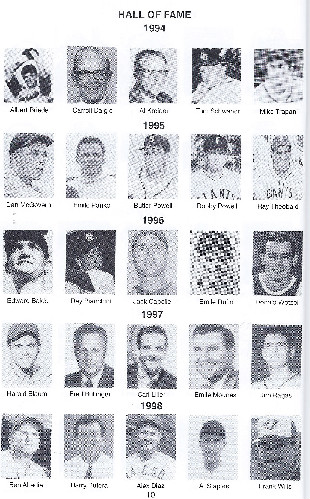
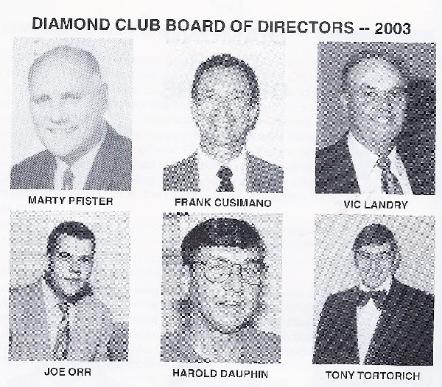
| In Memory of Ray Yochim |
| Diamond Club Board of Directors, 2003 |
| Below, Diamond Club Hall of Famers, 1965 - 2003. (Fred did his best with the scans and I did my best with the image editing, but I'm afraid many of these are difficult to read. If you would like further information, I'm sure Fred would be happy to provide it for you.) |